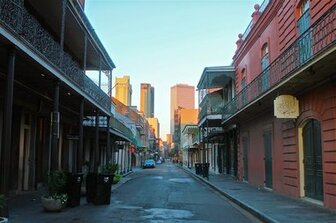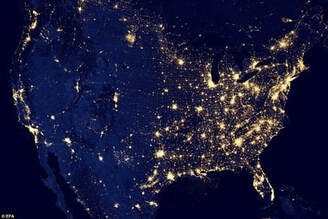 Since returning home to New Orleans last month to stay, of the many places that I've revisited was this one, the New Orleans Museum of Art. As I walked all of the conjoined rooms, I was stunned into humble submission as I realized the consistency of the artistic temperament. Last night I was reading through an English Literature textbook before bed (wanting to get into Dickens and got sidetracked) and I started reading Victorian writer and art critic John Ruskin's Modern Painters, in which he says that there is no difference between the painter who uses his series of skillful brushstrokes and the poet who uses language, for they are both simply the tools used to express their visions. I might add to this, visions that will make them immortal. And so there was that visit, but then there were also visits to small theatres where I saw stand-up comedy performed three feet in front of me, legendary music clubs where friends embraced me and asked me where I'd been all this time, private movie screenings and restaurants and bars and all those things that make up my roots. The streets materialized around me again as I instinctually just knew where to go, like a great city map that had begun rendering itself block-by-block, neighborhood-by-neighborhood. Never before in my life can I recall ever having had such a sense of belonging, part of a community of creatives that take from this city that which is all that it really has to offer, first and foremost a never-ending spring of inspiration embedded in every square mile. But back to the Rounds, and the Eight and Ninth have gone out within a month of each other, the latter of which actually produced a request for a partial. Self-publishing has not so much gone by the wayside again, but has dropped down the ladder a few rungs. At some point I'll begin submitting to publishers in addition to agents on a monthly basis, and I'll continue writing new things, and with that nothing has changed much at all. But can I get back to how wonderful it is to walk these streets again, how nourishing to the soul it is to have conversations that require no background or context and that go on for hours and hours until it's time to go home and begin these days again, and how a man can indeed go home? Okay, thanks.  Transition, powerful and sudden, a miraculous revelation that put me at one with the universe. But let's start with Cinco de Mayo. I wasn't aware that this holiday may or may not have been one of those times of the year when agents automatically delete queries sent to them, much in the same way I'd lamented my rookie mistake months ago (see "The Fourth and Fifth Rounds") by sending a batch off on Christmas Eve. I suppose it's still too early to tell, being that the Seventh Round went out a week ago, but I have to admit that the reception so far seems icy. But paired with some things that have crossed my mind quite a bit lately due to an illness that hit me in the beginning of March and ended with a surgery in mid-April, a span of two months that put me in an intense state of self-evaluation about my role if any in this world of publishing, it became apparent to me that maybe my patience is wearing a bit thin. So, take your time, prospective agents. As much as I wish one of you would latch on to my project and give it the representation that it deserves, I think I may be putting up that particular fishing pole for the time being. Well, at least I'm putting away the one with the kung fu grip in favor of multiple, lighter and less important ones. The plan is to send out a batch every month, to the few agents that are left all over the country and beyond. But in the meantime, I have been exploring self-publishing options in a turn of events that anyone following this blog probably didn't see coming. Things change, and the marriage of media and technology is no exception. To say that the world of self-publishing has changed since I did it last would be an understatement, but at the same time a lot of the same things still hold true. For instance, without the backing of a traditional publisher, for the most part marketing and publicity is still left completely up to the author. But that's okay, because hand-in-hand with the strides that technology has made in self-publishing, so has the means of getting the word out. And then I've heard through some confidants of mine on Team Torres that authors who self-publish now can actually earn a little bit of royalty that amounts to more than just a few cents here and there, something that in the past has always made me look forward to receiving my 1099 every year just for a good chuckle. As a musician, I still gig on the weekends and earn a little money here and there. But the way I see it, with pricing structures now in the hands of the authors, I can now count my books as things that actually make me some cash on the side. All the arrows are pointing in this direction, even now as I have the manuscript out to three different beta readers whom I don't actually think realize they are beta readers yet. I will follow up with them and initiate them officially, making then card-carrying members of the newly formed Team Torres. Yes, the process has begun. I'm still keeping one eye open to traditional publishing, because I do still plan to consistently chisel away at least once a month in both the agency and publisher markets. But I've already begun to imagine the cover design, and already have a member of Team Torres ready with his mighty Photoshop sword. There was always something special about the control of self-publishing, about the time leading up to and including the process, knowing that ultimately I would have a say on when and where my children were born.  I have pelted the east coast with queries at this point, with the Sixth Round deployed on March 3, 2014 to ten carefully chosen agencies. Some have come back within a day with rejections, while others are still pending within the time frames dictated on their websites. These things take time, and these agents are swamped by writers of varying degrees of determination, and this is the glacier-like nature of the business. But it looks as though, at least for now, my attack on the east coast has ended. There seems to be no more agencies left that would be appropriate for my special brand of psychosocial thriller, which while falling under the classification of "genre fiction" is still a bit of a rare subdivision. More and more I'm thinking about re-entering the self-publishing trade, if for no other reason than it seems that the business has evolved exponentially from I when I first published The Petrified Christ and Scenes from the Blanket over the course of the past fifteen years. And so the next rounds will spread out into the rest of the country, hitting the smaller less selective agencies that may find great interest in the subject matter of my unpublished New Orleans-themed manuscript. They're out there, and I would think that it's a rarity that authors with aspirations such as myself ever really consider querying anywhere outside of Manhattan, while still thinking that they were accomplishing something. But I totally do, because there comes a time when fishing in the big pond that houses the fewer fish may not be the way to sustain the hope that we as writers need to keep going, and this is just where I am in the beginning of my 42nd year. |
Categories
All
Archives
February 2021
|